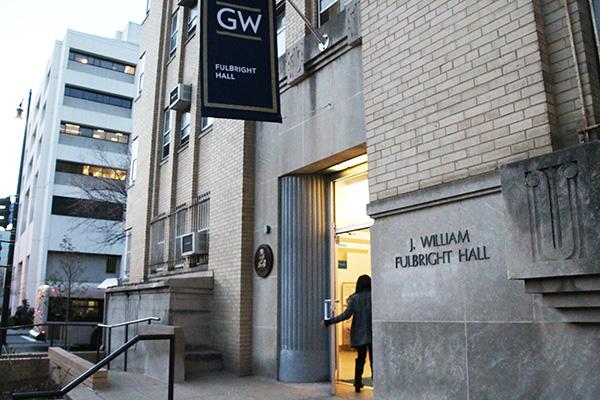About a quarter of undergraduate students surveyed who reported unwanted sexual behavior said they told resident advisers first, according to the results of a study gauging the sexual violence climate on campus, which were released last week.
That statistic, one of dozens that will help shape how officials respond to instances of sexual violence, has prompted Title IX Coordinator Rory Muhammad to start planning how to better equip resident advisers in halls across campus. Muhammad said he wants to increase the training and resources his office provides to them and housing staff.
“RAs are key because those are sometimes the first people that find out, whenever it may be,” said Muhammad, who started in his position in November, after the survey was conducted. As Title IX coordinator, he helps ensure the University is complying with federal anti-discrimination law.
Most unwanted sexual behavior on GW’s campus occurs in residence halls, according to the survey responses.
Residence Hall Association President Ari Massefski said he thinks it’s a good sign that students feel comfortable enough to report to a resident adviser.
“Everybody needs someone to turn to in your residence hall,” Massefski said. “When you have an RA you can turn to, that’s really important.”
A resident adviser, who spoke under the condition of anonymity because resident advisers are not allowed to speak to the media, said when a student tells a resident adviser that he or she has been sexually abused or experienced an unwanted sexual act, it’s the resident adviser’s job to call the area coordinator, a full-time staff member who is trained to handle sexual assault reports.
“Most of the training is learning the main protocol, [which] is just to put it up the system and call someone who’s actually trained to deal with it,” the resident adviser said.
The adviser said resident advisers are trained to console the survivor and help in any way possible to make him or her feel comfortable and safe. That could include anything from sitting with the student and talking or giving him or her space, depending on the situation, the resident adviser said.

“As RAs, our main job is to obviously be there to support the resident as much as possible, but to file the case, it’s really up to people who are most educated and prepared to actually deal with this,” the resident adviser said.
Director of the Center for Student Engagement Tim Miller said in an email statement that resident advisers always have access to professionals who are trained to handle reports of sexual harassment.
He said resident advisers themselves are taught to handle different kinds of sexual violence. They are trained to provide options for reporting and “up-to-date contact information for both GW and community resources available to students in need,” Miller said.
“The resident advisers are the front line staff for the Center for Student Engagement in GW’s residential communities and are a diverse and incredibly talented community of student leaders,” Miller said.
Resident advisers undergo a two-week training session before each fall semester. They also meet during winter break and monthly to brush-up on protocols. Sexual violence training is addressed regularly, Miller said.
They also go through a two-day live simulation to practice responding to student emergencies, including helping a survivor. After that period, Miller said University Counseling Center clinicians as well as GW’s victims’ services coordinator give feedback on how the resident advisers can improve their response.
Muhammad, GW’s new Title IX coordinator, said in an interview that he does not “have a baseline about what training” resident advisers already receive.
Resident advisers are not trained to bring the student to the University Police Department or act as a counselor, another resident adviser said.
“We legally can’t really give them advice since we haven’t been trained on that half of it,” the resident adviser said.
Among the undergraduate women surveyed who had experienced unwanted sexual behavior on campus, 16 percent said it occurred in a residence hall. Five percent of undergraduate men who experienced unwanted sexual behavior said it happened in a residence hall.
Among graduate students surveyed, most unwanted sexual acts occurred off campus, while undergraduate students said most of the acts they experienced happened on campus.
Colleen Murphy contributed reporting.








